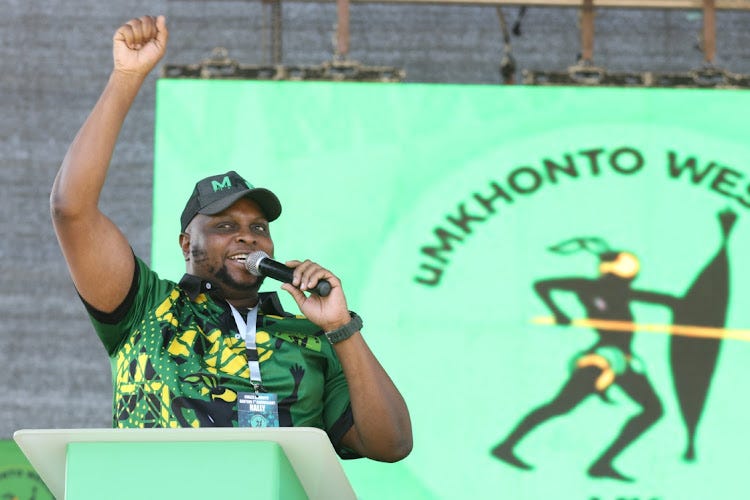The promise of liberation is breaking under its own weight
As South Africa’s left splinters under personal feuds, leadership scandals, and ideological confusion, hopes for radical transformation drift further from reality.
Once again, the headlines are out. uMkhonto weSizwe Party is in turmoil, to be questioned. Floyd Shivambu is now a former Secretary-General of the party, now parliamentary, and has been compared to the likes of Icarus on social media after a trip to Pastor Bushiri. This has raised an interesting question about left politics in South Africa: will it ever not be personal?
The controversy in question—the trip to Pastor Bushiri, a man wanted for fraud and corruption in South Africa—was the straw that broke the camel's back for Floyd Shivambu. In the aftermath of Shivambu stepping out, stories emerged about disgruntled constituents under his leadership, missed payments, and public spats with Duduzile Zuma-Sambudla. Shivambu was ousted from the position he had only received in November 2024, marking a short career as a political frontrunner of the party.
According to the MK Party, his trip violated Section 3(j) of the party’s Constitution, which prohibits international engagements not aligned with MK’s agenda. In a statement, the party noted:
“It was reaffirmed that the trip was not an officially sanctioned programme of the organisation or the President, which therefore goes against the constitution of the party. The President and the National Officials were left with no other option but to act swiftly in addressing this matter.”
Once cited for the brilliance of his political organisational skills and policy creation, he is now axed and placed in the hostile environment of Parliament. There are already rumours of a fractured relationship between John Hlophe and Shivambu after Shivambu was provided a speech that was claimed to be approved by former President Zuma, only to find out after the fact that it was not. He has not had a good relationship with the leader of the opposition.
Furthermore, there is an even less receptive tone from his former ally and comrade, Julius Malema—who in many ways has weathered the storm well and swelled to the centre of political discourse over the “Kill the Boer, Kill the Farmer” controversy.
Already distancing himself from Shivambu, Malema said:
“I don’t work with Floyd anywhere, Parliament, or soccer match, or anything. I don’t work with Floyd.”
He further discredited the presence of Shivambu in Parliament:
“So if you are saying this person is going to be in his Holy Spirit and be in every committee, then the MK presence in the committees is practically impossible. He cannot match the kind of leadership we are and have deployed in that Parliament,” Malema said.
He also dismissed the idea that he feels threatened by the re-emergence or potential of a working relationship with Shivambu:
“We don’t get threatened in that Parliament. We do our work, not because we want to outshine anyone, but because we genuinely believe in our work, and we put a lot of effort into researching what we are going to speak about. That, as a result, has helped to enlighten a lot of people in South Africa, that, ‘Oh, things work in that way’—because of the work of the EFF.”
“Nothing has changed. The EFF is in Parliament. The EFF will continue to play a meaningful role in Parliament."
Malema appears almost unbothered by Shivambu and the political changes within the MKP. Yet, the question remains: when will—if ever—there be left unity? In the eyes of the parties, black unity? Malema expresses a great deal of distrust and betrayal when asked about the potential for uniting black parties within South Africa:
"The EFF has always advocated black unity," said Malema. "But forming a new party and then calling for unity is disingenuous; that's already a division."
Within the MKP, internal dealings continue to overshadow a unified collective front and agenda that clearly outlines how the ideal of black unity is achieved or cultivated. These parties represent a constituency of disgruntled citizens who want and need more radical change to the system in order to continue to hold on and believe.
However, at every turn, political spats, personal agendas, and grudges being held by key leadership continue to limit the aspirations that a wealth of South Africa aspires to. If the left loses hope, the system begins to crumble—and apathy begins.
Now, all these political parties claim to be the party that will liberate South Africa, with strong emphasis on economic factors and wealth redistribution. Many are trying to actualise the words of the Freedom Charter and revive a more radical, socialist-leaning ANC, which was at times heavily influenced and led by SACP members. But maybe, as it was once then, it may be a dream never realised—simply a moment in history. Something to be discussed, and never seen.
Maybe that will become true of the leftist ideals that dominate discourse online in places such as X and YouTube. That it will simply be that—a conversation, nothing more. Something that South Africans can hold onto, just as the dreams of a rainbow nation washed and faded away.
In many ways, at the moment, South Africa feels directionless. Parties seem not to be towing the line, media campaigns and leaks appear to be at an all-time high, and even the Oval Office decides to get involved from time to time.
South Africa is in dire need of unity. For if not unity, we will be masked with fatigue, which may turn into energy for something far worse, far more uncontrollable, and far more unforgivable. It is time that everyone steps up and plays their part in this present crossroads that presents itself.
Whether it be the Left or the Government of National Unity, it appears that there is no agreement on the way forward for this country. South Africa has washed its rainbow into a storm, which is in great need of response.


